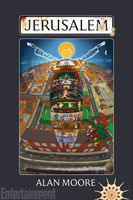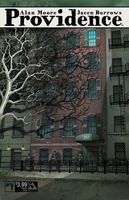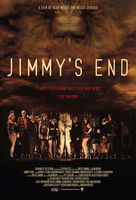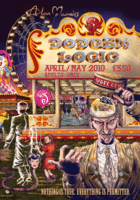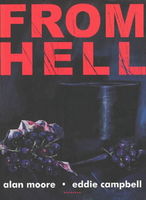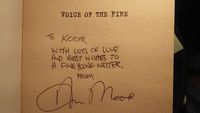'Putting Descartes Before the Horse'
By Koom Kankesan
You don't measure Alan Moore's writing in words; you measure it in Faradays. You measure it in Roentgens. After dropping five hundred megatons of creativity into mainstream comics during the eighties, he left to start his own concern - a creative fallout which the industry's still trying to grapple with - shaking the brittle dust of establishment from his skin. His writing since then has traversed history, fantasy, biology, cosmic paradox, local politics, genre identity, international news, and metaphysics.
Anyone who knows me knows that Alan is my favourite writer. Nay, my favourite person. It's rare to see someone with all the gifts and emoluments of success drop them in favour of the purest principles and praxis. His writing, besides being prolific and stretching the farthest imaginative spheres, is a baroque, intricate, living thing. Its force lifts flowers from the fields and sets them down again. It digs tunnels through the brain and forms connections you never knew existed. It is a circuit running on magic instead of volts.
Those that love his writing will feel it beating within the deepest knot of their bodies. It breathes out a network of neurological syntax. Intelligence radiates like capillaries, filaments shooting through heart and mind. He is a gorgeous man, appearing eneolithic, but the sprawling hair and flashing rings are a magician's misdirection. Close your eyes and you will hear his sonorous, pontificating pitch, that middle English brogue in freefall and delight, laying out the secrets of the universe on workman's cloth. Look closer and you will see the weary, quizzical muscles, deep brow and sunken cheeks, pools of experience and wisdom radiating round the eyes.
He smokes constantly, a hand rolled blend of hash and insight, the tics and textures of a thousand observations, between his fingertips, as he talks. In the end, what can I say about him that has not been said before? He is Rasputin and Rapunzel, Anubis and Annihilation. He is divinity in the clockwork, mercury upon the vine. Alan tends to have this effect upon people. I only met him once, briefly, at the screening of one of his films two and a half years ago.
But I hugged him.
Twice.
In the end, it will be said of him what Einstein said of Gandhi: people will find it hard to believe such a person existed.
I'm just going to waft here a little longer, floating a couple of metres in the air, while you read the interview.
Your CanLit News
Subscribe to Open Book’s newsletter to get local book events, literary content, writing tips, and more in your inbox
Koom: In latter years, especially as you've been talking about Jerusalem, you've been espousing your belief in the block universe: time itself has already played out and we are simply following its grooves. I've noticed this native belief in work throughout your career - it informs the framework and style of your 80s work. There are flashes of it in the early 2000 AD stuff - the Chrono Cops story for one example. Even time paradoxes in your writing work in accordance with the block universe.
You're also known for plotting out your immense and intricate sagas before beginning them. You have a gift for, and are given to, holding entire tapestries in your brain during the genesis of a project. Do you think that your ability to conceive and examine sagas in detail, and all at once, might predispose you towards seeing time/universe in a similar fashion? I.e. do you think that the way your neurons are creatively wired may influence the way you see the universe?
Alan: I suppose it’s possible that my neurological wiring ( i.e., a physical thing; something I actually am) might affect how I see the world (i.e., an intangible perception; something I think), but I’m afraid that I’d have to say that this seems to be putting Descartes before the horse. Yes, I know: that would in any normal circumstances be inexcusable, but in this instance it happens to reflect what I truly believe, which is that it is my way of seeing the world that informs my neurology rather than the other way about. I think that, in neurological terms, this is fairly uncontroversial – while certain areas of our neurology are hardwired or predetermined by genetic factors at birth (much as with all aspects of our being), a great deal of our neurology, our neurotic tics and quirks for example, are imprinted by our experience, which is to say by our perceptions of our experience, which is to say by how we see the world.
In an ordinary sense, my way of seeing the world when I was still in my early childhood – the common childish notion that the past and future must be existing landscapes somewhere – would perhaps be enough to account for the thought processes leading to my writing Jerusalem and the various other works with this theme that you mention. By ‘ordinary sense’, incidentally, I mean ordinary, objective, rational sense. However, my personal experience of the world contains numerous things that are purely subjective, that are not strictly rational, and that by my own standards for such things, I would not classify as ordinary. A couple of examples, which you are under no obligation to come to any conclusion regarding, save that you accept my sincerity when I state that these are actually incidents which happened in my experience, if nowhere else. The earliest occasion I can remember was my first morning at infant’s school, aged maybe four or five. Our first year teacher Mrs. Corriers (I think that was how she spelled it) had just read out the class register for the first time, commencing with the boys, because ours was clearly the more important gender. The moment after Mrs. Corriers intoned “Now the girls...” I suddenly had a rush to the head of unfamiliar names: Janet Bentley, Delia Boddington, Delia Clarke; there may have been others. A second later, the teacher read out those names, in that order, each one eliciting a “Here, miss.” I noted it at the time to myself, but don’t think I mentioned it to anyone, since at that age I didn’t really have a way of evaluating this as an out-of-the-ordinary experience.
There were other mild examples of this throughout my life – precognitive dreams of completely nondescript or unimportant things like my receiving a paperback copy of a Christian interpretation of Charles Schultz’s Peanuts when I was around twelve or thirteen – that can all certainly be explained as coincidence, except that this was not my subjective experience of those incidents. Another memorable occurrence comes from the early 1980s during the course of my first marriage. One of my then-wife’s female friends had been visiting for the evening, and when she had to walk home later, I offered to walk with her and see that she got back to her place okay. While we were walking the maybe quarter-of-a-mile between our two addresses, she was telling me how much she was enjoying her new job, and how much she liked the people she was working with, particularly a woman she felt an affinity for because “she likes reading Fay Weldon novels in the bath.” Immediately, it came to me in an almost matter-of-fact way that this work acquaintance was gay; that our friend would be involved in a long and serious relationship with this woman; and that when the relationship finally concluded, our friend would to a degree find herself psychologically stranded in territory that she was not necessarily designed for or comfortable with. This whole narrative took maybe a second to pass through my mind before I rebuked myself for having such ridiculous flights of imagination and put it down to a writer’s compulsive desire – or at least my compulsive desire – to turn everything into a narrative. Then, over the following three or four years, everything happened just as I’d fleetingly imagined it would, and I was left to consign the incident to the drawer in my mental filing cabinet marked ‘Things I’m not entirely sure about and which may or may not be related to each other, but which at the same time may reward consideration and perusal at some future date.’ One of the convergent strands that led to me declaring myself a magician in 1993 was the fact that this particular filing cabinet drawer was becoming full to overflowing and finally demanded that its contents be paid serious attention to. So, to some degree, this is how I’ve seen the world since I was small and this is what has informed both my neurology and a lot of my writings, although obviously it’s taken me a long time and a lot of creative work with those concepts before I could articulate them as lucidly as I’ve hopefully managed with Jerusalem.
Koom: You are one of the most driven/hard working writers I know. You are also someone who fiercely believes in freedom and individual choice. Wouldn't the belief that everything has already happened make you somewhat resigned when it comes to drive and creative ambition? Whereas, you are the opposite?
Or am I thinking of it wrong? In certain worldviews, there is a sort of (usually downbeat) resignation to fate - is your own worldview akin to this resignation? How do you reconcile free will with your beliefs? I would think that belief in free will would be very important to you.
And... why is the universe constructed/run this way? What are your musings on the reasons/forces behind our time/space's architecture?
Alan: I can really only refer you to the builder’s response to Phillip Doddridge’s question about whether human beings ever truly possessed free will: “No. Did you miss it?”
To unpack that a little, it seems to me that I am predetermined to be a driven and ambitious individual, who looks forward to finding out how his future unfolds with a sense of eager curiosity rather than resignation. I honestly can’t see why I should feel limited or dismayed by that, when actually it’s quite a lot of fun. And with regard to freedom, I think you may be confusing different types of freedom here: do I wish to be free of oppression and discrimination; free to live my life as I, not unreasonably, desire to live it? Yes, of course I do. These are human-imposed limitations to my freedom, and as a human I have a right to question or reject them. Do I wish to be free of the law of gravity, for example, so that I could fly downtown instead of walking? Do I wish to be free of the square/cube law, so that I could become a giant without collapsing beneath my own mass? No, not particularly. These are laws of physics, and for a human to reject them is at best ludicrous hubris and at worst psychosis. With regard to a four dimensional ‘block’ universe, if this is the way that the universe is truly constructed then it would surely be both futile and a little sulky to be disappointed in its workings. And as for the weariness that you suggest as a reaction to this having all happened before, I’d have to say that it hasn’t actually happened before. Every event in spacetime is unique and happens – with precisely those parameters – just once. The recurrence is only experiential, is experienced only by us, and is experienced in such a way that we are not aware of any previous experience. It strikes me that the central issue here is something that I touch on in the ‘Cornered’ chapter, concerning all the moral or amoral implications of a predetermined universe without free will, where I conclude that what defines the question is the point of view from which we look at it: from the imaginary point of view of some objective observer that is somehow outside the entire continuum (say God, for instance, or perhaps the abstract notion of an objective scientific worldview), in which case it is static, unchanging, limited, and has no possibility of either sin or virtue; or else from the real viewpoint of organisms within that system, in which case it is in constant motion, endlessly mutable, limitless, and we as humans will continue to take pride in what we see as our good acts, and will continue to feel guilty over what we think of as our bad ones.
As for your final minor query as to why the universe should be constructed in the way it is – and I don’t think that’s really a minor query, is it? – then I’d have to say that, fairly obviously, I don’t know. If I were to hazard a guess as to how a block universe could have come to exist in this form, then I could only return us to the standard pair of explanations for how any universe might come to be: either (a) by cosmic accident, or (b) through intervention by some manner of creator or creators. In the first instance, I imagine spacetime to have suddenly been expelled, every inch and every moment of it, all at once from some kind of primordial quantum vacuum through the agency of natural forces that we do not currently and possibly may never understand. In the second instance, I’m reminded of a conversation on Eternalism with the late Steve Moore. We were speculating how that worldview could affect religion, by removing the main basis for ideas of sin or virtue, and how it could affect science by calling into question basic principles such as cause and effect. We agreed that one thing such a radical revision of the way we saw the universe would bring about was the need for a closer examination of the narrative aspect. If there were a creator to the universe, then their most likely motive, it would seem to me, would be artistic. Seen in this light, I can construe spacetime as being a kind of unimaginably complex hyper-narrative, a fifth-dimensional novel, or comic strip, or movie, presumably for the aesthetic enjoyment of its unimaginable audience. After all, the characters in Jerusalem who are concerned about the mysteries of space and time would have all their questions answered if someone informed them that, in actual reality, they were all characters acting their predetermined roles in an unusually big and complex narrative. But then, as a writer, I’m probably predetermined to perceive the universe in terms of my own profession. At the end of the day, your guess is probably as good as mine.
Koom: I really love the way you handle language - you have an ornate and richly expressive rhythm, a sensibility that pulls together specific and evocative references to a variety of things that don't seem to intuitively go together. It seems to be a natural gift - you roll these sentences off the tongue as easily in verbal interviews as you do descriptions upon the page. I know that you think the question 'where do your ideas come from?' is a silly query, but what about 'where does your language come from?' Can you speak to why you express things the way you do? Influences? Your own conscious choices? Or once again, is it a case of unique wiring?
Alan: What I actually said regarding the perennial “where do you get your ideas from” question was that while all writers hate being asked this, I was fast coming to the conclusion that it was in fact the only question worth asking. My own inability to answer this question adequately was another of the convergent vectors that led to me becoming a magician, so I might possess a conceptual language sufficient to furnishing an answer. That answer has been expressed in Promethea and a wealth of other places, and probably doesn’t need reiterating here.
Regarding the question “where do (I) get (my) language from”, I think that’s much easier to answer, and involves less metaphysics.
As a toddler, I came to realise (albeit I’m sure only dimly) that language was what gave me agency in the world. I understood that the more fluent and inventive my speech was, the more the adults around me whom I depended upon were impressed, or amused, or provoked to some other generally favourable reaction. The more I came to understand about language and the things it could do, the more enthusiastically I assimilated these techniques or effects into my growing arsenal of abilities. The rudiments of poetry, for example, rhyme and meter, are relatively easy to obtain a grasp of, and by the time I was beginning to learn to write I found that a competently constructed poem was a sure fire way of impressing the hell out of my mother, my aunts or my teachers. So far, I think it’s pretty plain that my motivation in all this was “look at me, mum!” Not that I was in any way starved of attention by my parents, just that, as it turns out, I was inordinately greedy for it.
By the time I was twelve, I think I was more interested in my writing as a thing in itself rather than as a way of courting praise and attention, although it’s likely there was a fair degree of overlap in that particular Venn diagram. By then I’d absorbed a large amount of nonsense poetry (which I’d always had an interest in because of all the outrageous things it does with logic and language), ghost stories, science fiction stories, and the other material you might expect from a boy of that age. All of these things would be filleted for the aspects that seemed to me to be of most worth, which would then be assimilated, clumsily and ineffectively, into my own attempts at writing. By a year or two later, I’d stumbled upon Mervyn Peake’s Gormenghast trilogy, and you could reasonably identify that as the point where I began to realise what words and the imagination were capable of.
My literary baptism beyond that point seemed to occur in a giddy rush: my early infatuation with science-fantasy and in particular with Mike Moorcock’s Elric books led me to investigate, at the age of fourteen, the same writer’s editorial tenure on New Worlds. Which wasn’t at all what I’d expected. New Worlds introduced me to the concept of modernist or avant garde writing and provided the bridge that I’d need to approach William Burroughs and all the other writers and artists that I was about to become feverishly interested in. And all the time, anything that seemed like an interesting approach or an interesting effect or an interesting atmosphere would be filed away as a potentially useful part of my meagre repertoire. As an example that may be of interest, I think that it was also when I was fourteen that Penguin books released their edition of the Mersey poets, The Liverpool Scene. This contained a poem by Brian Patten called "Where Are You Now, Batman?" It took the comic book heroes (or perhaps more accurately, the movie-serial heroes) of Patten’s youth and recast them in an atmosphere that was more psychologically modern, making them unusually poignant in the process. I recall a line about Blackhawk committing suicide in “the hangars of lost innocence.” I think at the time I attempted slavishly to turn out a similar poem – a line about Rocket Man’s fuel tanks having given out high over London – before realising that to mimic the poem would be accomplishing less than nothing, and that the thing to do was to isolate the central effect that I had found so powerful, which was simply the situating of fondly-remembered children’s characters in a modern world that was no longer appropriate to them.
Obviously, a decade or so later I found a way to put this principle to work in a great deal of my early superhero material.
Since then I have continued the same process, seeing no reason to change something that seems to be working pretty well by itself: every truly good book that I read expands me as a writer by giving me a revised idea of what is possible. This is true of Moorcock’s Mother London, or Ginsberg’s poetry, or David Bowie’s song writing, or Pynchon’s Gravity’s Rainbow, or Sinclair’s White Chappell, Scarlet Tracings, or David Wallace’s Infinite Jest, or an endless list of others. So, yes, I suppose you could say it was a case of unique writing, as long as that came with the proviso that it was writing informed by everything – good, bad, or indifferent – that I have ever read or listened to. I suspect you could say pretty much the same thing about any ‘unique’ writer.
Koom: I once suggested that people should start a petition for you to be considered for the Nobel Prize in Literature. Apparently, you got wind of this and squarely expressed your displeasure. However, in light of Bob Dylan receiving the prize this past year and comics uncomfortably entering bookstores and the world of literature like an uneasy hanger on at a Christmas party, don't you think your own work might be original and noteworthy enough to at least be considered? When I was young, I used to try and convince friends to read your work by saying 'if this guy wrote fiction instead of comics, he'd win a Nobel.' Now, of course, you have branched out in a variety of media, including many forays into prose and the recent film work.
Much of your comics work from Watchmen to Supreme to the ABC stuff was primarily concerned with cataloguing cultural and influential forces, inscribing them within context and era. How easy do you find it to reflexively look back on your own work and its impact? Are you able to objectively look at your own work at this point, your influence on things? Does that orient the projects you embark upon, or do you shudder at the thought?
Alan: I’m afraid you’ve underestimated my ludicrous arrogance: I believe all awards, from the Eagle to the Pulitzer to the bottle of Bart Simpson bath foam that I was given as a Lifetime Achievement Award by one of the British conventions, to be meaningless and have made it clear that I really don’t want to accept any such thing, either now or in the future. So it isn’t really a matter of me wondering whether my work is original or noteworthy enough to be considered for an award, which would be a position of humility that I really don’t think I could pull off with a straight face. It’s much more a matter of me seeing awards as not being noteworthy enough to be considered by me. I hope that clears things up on the award front.
As far as looking back at my own work, having disowned the greater part of it and no longer possessing copies, I can honestly say that I don’t really look back at it at all. As for judging my work’s impact, that is also something which I don’t care to concern myself with, partly because of the fairly obvious futility of such an assessment.
For example, is the impact of Watchmen to be measured in terms of whatever new ideas it may have brought to the medium, or in terms of the way in which it was marketed, as part of the “comics are for grownups” pitch that has left us with our supposedly adult cinema industry dominated by formerly juvenile concepts that Jack Kirby dashed off in a rush of inspiration fifty years ago? As far as I can see objectively, the most prominent part of Watchmen’s legacy is the continuing stalled nature and intellectual impoverishment of the mainstream comic industry. So, no, even with works that are still dear to me, I prefer not to try and judge their impact. If whatever I was trying to do worked and had the social effect I was hoping for, then there’s no real reason to pay attention to the work itself. And by the same token, if whatever I was trying to do didn’t work, then exactly the same thing applies. I think something like impact is a subject best considered and evaluated by other people, preferably long after the focus of their enquiry is dead. So, in light of the above, thinking about my former impact certainly plays no part in the conception of any new work, at least not for me. David Foster Wallace, on the other hand, seems to have fixated on the necessity for his third novel, The Pale King, to achieve a greater impact than that of his immensely successful second novel, Infinite Jest. You never want to over-simplify such painful matters, but it nonetheless looks likely that Wallace’s obsessive quest for greater impact played its part in his decision to take his own life in 2008, with The Pale King apparently only half completed. I think there’s a lesson for all high-achieving creative individuals there, if it’s only “Don’t concern yourself with considerations of impact or legacy, because these things can paralyse or even kill you.”
Koom: You have mentioned in interviews that you feel as if our culture is coming to an apocalyptic moment. You've said many times in many ways that you don't see the idea of apocalypse as a bad thing, but as a change. You've also talked about culture as like steam, the fact we're accelerating through stages of progression. I want to get a sense of how you feel these days. Do you still feel this apocalyptic moment is imminent? Or: has it already happened? Do Brexit and Trump have anything to bear on your sense of this? What do you see for 2017 and the next few years?
Alan: As a preliminary, I should perhaps point out that while I stand by my interpretation of apocalypse as revelation, as some sort of explosive information that would fundamentally reorganise how we see the world, and while I also maintain that this could generally be a ‘good’ thing or at the very least a necessary thing, none of this precludes a physical and material end-of-the-world, whether by environmental collapse, or thermonuclear exchange, or both through the simple expediency of entrusting environmental agreements and the nuclear codes to some kind of National Socialist Satsuma who believes climate change to be a Chinese hoax. This, to make myself very clear, I would see as neither good nor necessary.
On your broader point, however, the thesis I suggested in the Mindscape documentary was that information can be seen as analogous to heat, and that as our species has accumulated information at an ever-accelerating pace, so too has it been subjected to a kind of cultural and social warming. I suggested that this information build up could be seen in terms of an ice-age hunter gatherer representing, say, cold water, while a contemporary city trader with several thousand years of accreted information (and thus a state of greatly increased complexity) could be represented by very hot water. What I meant to imply by this was that despite the enormous differences in the lives of an ice-age hunter gatherer and a present-day businessman, in terms of the analogy both are still represented by water. Both are still essentially the same substance, but at different temperatures of information, if you will. I further suggested that with our continuing and accelerating accumulation of information, we may be approaching a kind of boiling point. The boiling point of water is an example of what is known as a ‘phase transition period’, a period of monstrous mathematical complexity where what goes in at one end (in this instance water, a fluid) emerges at the other side of the transition as a completely different substance (in this instance steam, a vapour). I was suggesting that this ‘human boiling point’ would probably be occurring around, well, now, actually, and that the condition of humanity emerging on the event’s far side would be, by analogy, as psychologically different from both the city trader and the hunter gatherer as steam is different from water. While this was only a speculative model, I haven’t seen a great deal in terms of human development that does anything to disprove or falsify this hypothesis although these are, of course very early days.
The model I’m currently favouring, while I think it entirely congruent with the phase transition hypothesis, gives a longer and more comprehensive context for the historical change of the human state described above. This model is based upon the hermetic/alchemical formula solvé et coagula, in which solvé refers to the process of reductionism or analysis, in which the whole entity (say human culture, or else a stopped pocket watch) must be taken apart to its smallest and most indivisible components so that it can be completely understood before the necessary reassembly is commenced. This reassembly process is what is described by the term coagula, which refers to holism rather than reductionism and synthesis rather than analysis. In terms of my own personal (and probably highly idiosyncratic) view of human history, we commenced with the Neolithic Shamanic worldview as an all inclusive and holistic proto-philosophy in which the all of human culture was contained, and in which all of our nascent science, art, spirituality and other fruits of consciousness were subsumed. The process of solvé and the dismantling of an inclusive magical worldview would seem to have (probably necessarily) commenced with the beginnings of urban settlements, and would seem to have continued to the present day, when our cultures and indeed we, the individuals who comprise those cultures, appear to be in a state of absolutely disconnected fragmentation – or perhaps a state of complete solution. In terms of this alchemical model, the recent Brexit referendum and the Trump electoral victory (both, I think, examples of a preposterously whipped-up electorate voting for things that aren’t actually possible) can be seen as the last necessary reactions in the long process of solvé that commenced with the founding of Ur. If this model is correct – and that’s a worryingly big ‘if’ just at the moment – then what I would expect to see (perhaps even as a reaction against this appalling right-wing/fundamentalist drift afflicting the entire globe at present) is a counter-movement predicated on social cohesion, progress and interconnectedness, and a growing realisation that the vast majority of our previous thinking, along with the social institutions and mechanisms we based upon that previous thinking, is not only useless in the world of today but is, in truth, fatally dangerous.
In summary, then, the pocket watch has been dismantled down to its tiniest scruple, and is spread before us on the black velvet cloth. All we have to do is put it back together in an improved – or at least more completely understood – form. And we might be well advised to first rinse away these unpleasant gobbets of lard that seem to have somehow got caught up in the mechanism.
The portrait of Alan Moore attached to this post was taken by Mitch Jenkins.
The views expressed in the Writer-in-Residence blogs are those held by the authors and do not necessarily reflect the views of Open Book.
Koom Kankesan was born in Sri Lanka. While his family lived abroad, the civil war in Sri Lanka broke out and this caused them to seek a new home. They eventually settled in Canada and have lived here since the late eighties. He has a background in English Literature and Film Studies. Koom contributed arts journalism to various publications before becoming a high school teacher in the Toronto District School Board. Since working as a teacher, he has taken semesters off now and again to work on his fiction. The Tamil Dream, his new book, is his most ambitious to date. It looks at the end of the civil war in Sri Lanka and how it affected Tamils here in Canada. Besides literature and film, Koom has deep interests in history and science, and an enduring love for comic books.
You can write to Koom throughout January at writer@open-book.ca.
